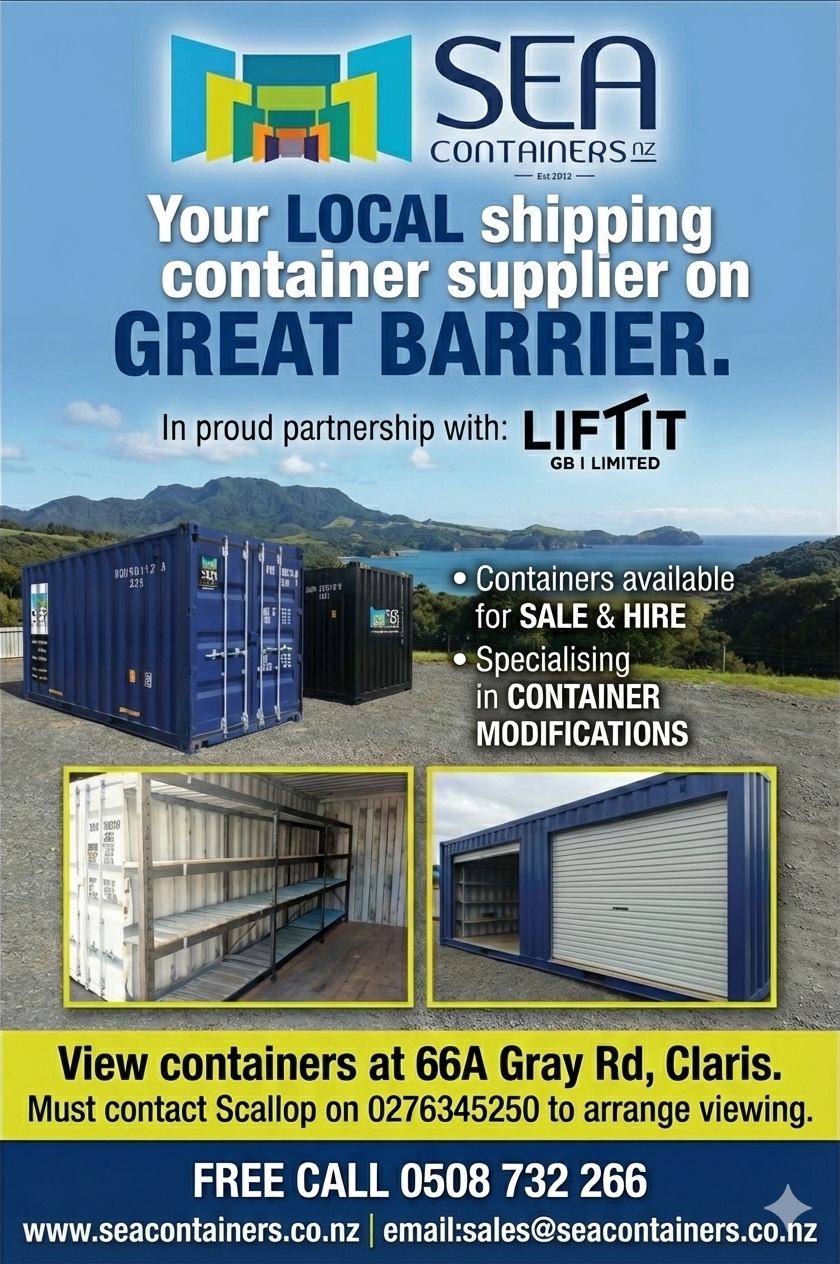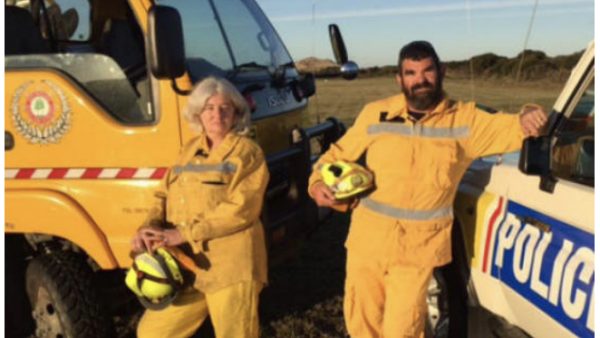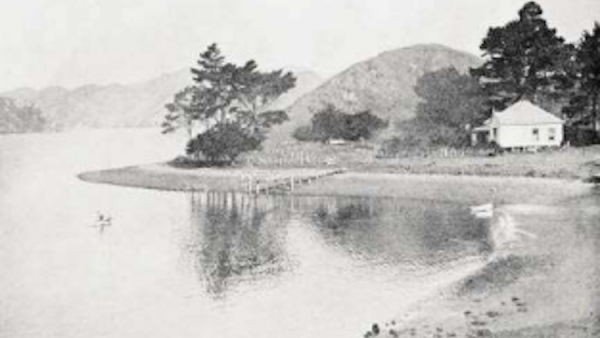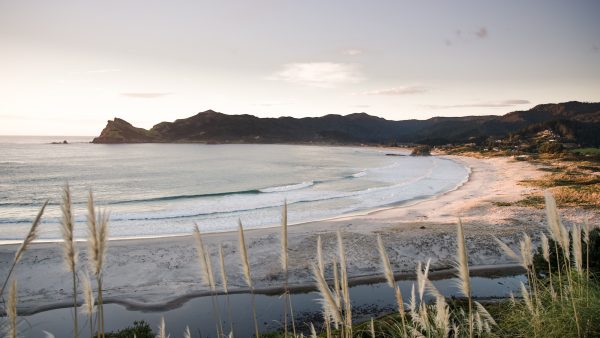Off to Great Barrier in 1971
By B.Harvey
At last the moment has come. We are down at Mechanics Bay watching the amphibian being loaded. The air is filled with the rowdy buzz of the city. There are twenty or so people and a great conglomeration of stuff piled all around the Grumman Widgeon which perches heavily above the slipway. Freddie Ladd gradually organizes people and their possessions and shows them to their seats. The passengers seem to know him and each other and there are cheerful directions and cheeky comments flying around. Loading is a cooperative, noisy affair with one pile of maybes that might be on the next flight, or the next. Even the aisles of the seaplane are stacked. A final very long, thin, circular corrugated cardboard package is gingerly threaded through the window after its owner and lies right across his lap and over his fellow passengers across the aisle. Plants and pets are put in last and passed into their owner’s care. Freddie climbs in through his window in practiced fashion (it’s the only access still available), the engine leaps into life, we taxi down the slip and slide seamlessly onto the sea. With revving engines, swooshing water and the baby howling in my ear we plough over the sea until, with a mighty roar, the plane tears itself into the air. We do the futile waving gesture as we gain height.
The engines settle to a steady drone and we level out. Freddie’s voice comes through the sound system welcoming the passengers on board. He introduces us to everyone as the new schoolteacher and his wife and prospective pupil and gives them our names. “How did he know all that?” I wonder. He even has the baby’s name. He tells us all, the route the plane is taking and how long each leg of the trip will take. “Great, we get off at Tryphena, the first stop. That’ll be enough time for struggling with a frightened baby and wondering what it’ll be like over there,” I think to myself. He summarizes his tale with likely arrival times. So we’ll be there in our new world in just three quarters of an hour. Suddenly, the aircraft floor is really vibrating, the sea is directly ahead and we are headed at it. We swoop straight down as Fred has spotted a whale and is zooming us down to check it out, whilst giving us a knowledgeable description. He’s in his element and volubly sharing it all, just doing his thing. Now we see blank blue sky and feel the backs of our seats as we bank steeply up to horizontal. Our ears are popping, baby’s cries harder. Again the engines pound as we climb and then settle. All around us the sea is blue, the sky is blue and so is the long, thin smudge on the horizon that is slowly growing bigger. Thoughts of the wood stove, a power generator, shopping by letter from Auckland, having to bake our own bread, crank handle party-line telephones all spin through my keyed up mind. Memories of my remote, far north childhood came flying back to reassure me. I grew up with some of these ways. That razor back skyline materializing actually looks vaguely familiar. Beef, bread and beer; these are the things we have told would be visitors they must bring. Teaching just twenty kids through all the primary school levels, now there’s an interesting challenge. And there’ll be no-one we know there, absolutely no-one. There far below on the vast, shiny sea I recognize the tiny barge with the bright green McGregor’s van that holds all our worldly belongings. Our brilliant blue, newly acquired, old Volkswagen is jammed up against it. They are Matchbox Toys afloat. All the things vital to me are here with me now, my baby, my man and my photograph album. “This is a good thing to keep in mind for the rest of my life,” a savage flash of insight tells me. I am grimly smug to have excluded the recipe book my mother in law recommended should travel with me, little knowing quite how much I would need it. Life is feeling quite fragile right now.

The long, distant island is growing bigger and becomes dark green, and now all the greens and greys, as details come to life. The outline becomes jagged and inhospitable even as it lies motionless in the shining, silver sea. The seaplane zooms gently lower and lower as we enter the wide outreaching arms of the Tryphena Harbour. We seemed to skim the water, flying ever inwards. Inwards toward the two or three tiny houses on the innermost central bay, flanked by all its bays. The hills rise steeply up from the sea all around. “The school is right on the water,” they told us. So that must be it, just two tiny prefab classrooms behind a rocky sea wall. And that must be our house across the road, the black creosoted place. They all look so small. It’s the second house they sent. I remember now, they tipped the first one into the tide on its way over from Auckland. I didn’t pay that much attention at the time. Soon the water gushes from our sides as we contact the sea. Gradually the splashing of the water eases as we lose speed. With a great roar the seaplane lurches, heaving itself out of the sea and up onto the beach. It twirls to turn around, spraying drops of water from its flanks, and taxis to a stop. The engines cut to reveal total silence, then gentle birdsong. There somewhere in the small knot of greeters, I am hoping, will be the chairman of the School Committee. How to summon a public persona with a fraught baby, rumpled body and gob-slammed brain? Yet, there it is, the kind, quiet, tentatively smiling face, “Welcome to Great Barrier. Let’s walk over to the school. We’ll have afternoon tea and we can get to know each other. Afterwards we’ll walk over to the school house and the barge will come up on the beach here with your things. We’ll give you a hand to get set up.” All organised. Just like that.







